
Emotions-History Culture Society
Scope & Guideline
Fostering Dialogue on Emotion's Role in Shaping Society
Introduction
Aims and Scopes
- Interdisciplinary Exploration of Emotions:
The journal integrates insights from history, sociology, literature, and cultural studies to investigate how emotions shape and are shaped by human experiences across different periods and contexts. - Historical Contextualization of Emotions:
A significant focus is placed on understanding emotions within their historical frameworks, examining how societal norms, cultural practices, and individual experiences influence emotional expressions and interpretations. - Cultural Representations of Emotion:
The journal seeks to analyze how emotions are represented in various cultural artifacts, such as literature, art, and performance, thereby contributing to the understanding of collective emotional landscapes. - Emotional Politics and Social Movements:
There is a consistent emphasis on exploring the role of emotions in political contexts, particularly how emotional appeals can mobilize social movements and influence political discourse. - Gender and Emotion:
The journal often examines the intersections of gender and emotion, investigating how emotional expressions and expectations vary across different genders and how these dynamics impact historical narratives.
Trending and Emerging
- Emotionality in Non-Human Contexts:
There is a rising interest in exploring emotions in relation to non-human entities, particularly animals, as seen in studies addressing animal emotionality and its implications for understanding human emotions. This trend highlights a shift towards more inclusive emotional studies. - Intersection of Emotion and Material Culture:
Recent themes have increasingly examined the connections between emotions and material culture, investigating how objects and environments evoke emotional responses and contribute to cultural narratives. - Emotions and Global Political Movements:
The journal has seen a surge in articles addressing the role of emotions in global political movements, particularly in the context of contemporary issues such as nationalism, migration, and activism, reflecting the urgency of these themes in current discourse. - Embodied Emotions and Selfhood:
Emerging discussions focus on the embodied nature of emotions, particularly how individual identities and selfhood are constructed through emotional experiences, often in historical narratives. This trend emphasizes the personal and subjective dimensions of emotional studies. - Nostalgia and Memory Studies:
The exploration of nostalgia and its emotional implications has gained traction, with recent papers examining how collective memories shape emotional landscapes in various historical contexts.
Declining or Waning
- Traditional Psychological Approaches to Emotion:
There seems to be a waning interest in strictly psychological analyses of emotions, particularly those that do not consider broader cultural and historical contexts. This shift suggests a preference for interdisciplinary approaches that incorporate social and cultural dimensions. - Emotional Theories from Classical Antiquity:
Studies focused on ancient philosophical perspectives on emotions, such as those from classical antiquity, are appearing less frequently. This may indicate a move towards more contemporary frameworks that resonate with modern emotional experiences. - Emotional Narratives in Isolated Historical Contexts:
There is a noticeable decline in papers that examine emotions in isolated historical contexts without linking them to broader cultural or social implications. The trend suggests a growing preference for interconnected analyses that emphasize the relational nature of emotions.
Similar Journals
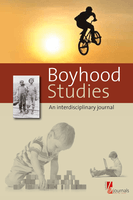
Boyhood Studies-An Interdisciplinary Journal
Exploring the Complexities of Boyhood Across DisciplinesBoyhood Studies-An Interdisciplinary Journal, published by BERGHAHN JOURNALS, is a pioneering academic platform that examines the multifaceted dimensions of boyhood from an interdisciplinary perspective. With its ISSN 2375-9240 and E-ISSN 2375-9267, this journal caters to a diverse audience engaging in cultural studies, gender studies, developmental psychology, education, and social psychology, reflecting its robust intellectual scope. Between 2018 and 2023, the journal has established itself as a significant academic resource, attaining a Q1 ranking in Cultural Studies and consistently contributing to advancing discourse surrounding boyhood. Though it does not currently offer open access, its impact within the scholarly community is underscored by its scopus rankings, including 73rd percentile in Cultural Studies. Researchers, professionals, and students can find valuable insights that challenge traditional narratives and promote a deeper understanding of boyhood in contemporary society, making it an essential read for those invested in the developmental and educational trajectories of boys.

SOCIETY & ANIMALS
Connecting Research with Contemporary Societal IssuesSOCIETY & ANIMALS is a distinguished journal published by BRILL that has been a vital platform for interdisciplinary research at the nexus of human-animal studies since its inception in 1993. With an ISSN of 1063-1119 and an E-ISSN of 1568-5306, this journal offers valuable insights into the philosophical, sociological, and political dimensions of human relationships with animals. It holds an impressive standing, ranked Q2 in the field of Philosophy, Q3 in Sociology and Political Science, and Q4 in Veterinary (miscellaneous) categories, demonstrating its diverse relevance across multiple disciplines. By bridging academic inquiries with contemporary societal issues, SOCIETY & ANIMALS facilitates an engaging dialogue among researchers, professionals, and students, encouraging a deeper understanding of our evolving interactions with the animal world. Although currently not an open-access journal, it remains an essential resource for scholarly work and continues to influence research trends within the realms it covers.
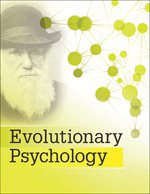
Evolutionary Psychology
Transforming Psychological Research with Evolutionary PerspectivesEvolutionary Psychology is a crucial journal published by SAGE Publications Inc, dedicated to exploring the intersection of psychological sciences and evolutionary theory. Established as an Open Access platform since 2003, this journal aims to facilitate the dissemination of groundbreaking research that examines how evolutionary processes shape human behavior and cognitive functions. With a range of articles that cater to various aspects of psychology, especially in fields such as Behavioral Neuroscience, Social Psychology, and general Medicine, the journal holds significant relevance in contemporary academic discourse. Although it currently resides in the lower quartiles (Q4 and Q3) in its respective categories, it provides a vital space for innovative ideas and perspectives, inviting researchers and students to contribute and engage with the rapidly evolving understanding of human psychology through an evolutionary lens. The journal is indexed with an ISSN of 1474-7049, ensuring broad accessibility and outreach to a global audience.
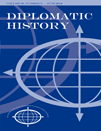
DIPLOMATIC HISTORY
Unraveling the Threads of International RelationsDIPLOMATIC HISTORY, published by OXFORD UNIV PRESS, is a leading academic journal in the field of diplomatic studies, boasting an impressive Q2 ranking in History and a notable 84th percentile among the top arts and humanities journals as per Scopus rankings. Since its inception in 1977, this esteemed journal has consistently provided a scholarly platform for rigorous research and innovative discussions surrounding the dynamics of international relations, statecraft, and political diplomacy. With contributions from esteemed historians and emerging scholars alike, DIPLOMATIC HISTORY endeavors to examine historical contexts that shape contemporary diplomatic practices, fostering a deep understanding of past and present geopolitical landscapes. While this journal does not currently offer Open Access, it remains a vital resource for researchers and professionals striving to enhance their expertise in the complex interplay of history and diplomacy.

Cultural History
Exploring the Intersections of Culture and HistoryCultural History, published by Edinburgh University Press, is a pivotal journal in the fields of cultural studies, history, and political science. With an ISSN of 2045-290X, this quarterly journal has been contributing to the academic landscape since its inception in 2012 and continues to serve as a vital platform for scholarly discourse through 2024 and beyond. Although it falls within the Q4 quartile of its respective categories, it boasts commendable rankings in the Scopus database, reflecting the growing interest and relevance of its research contributions, particularly in the realms of Arts and Humanities (Rank #444/1760) and Social Sciences (Rank #478/1304). Researchers, professionals, and students can engage with a wide array of articles that delve into diverse cultural phenomena, offering critical insights into historical contexts and contemporary implications. While the journal currently does not provide open access options, it remains an essential resource for those looking to deepen their understanding of the intricate relationships between culture, history, and political dynamics. For subscription or further inquiries, please contact The Tun-Holyrood Rd, 12 2F Jacksons Entry, Edinburgh EH8 8PJ, Scotland.
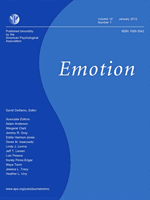
EMOTION
Advancing Understanding in Emotional PsychologyEMOTION is a leading peer-reviewed journal published by the American Psychological Association, focusing on the intricate dynamics of human emotions. With its ISSN 1528-3542 and E-ISSN 1931-1516, this esteemed journal has established itself as a pivotal resource in the fields of Psychology and Medicine, proudly ranking in the top quartile (Q1) according to the latest metrics and scoring a remarkable position as #22 out of 216 in the Scopus General Psychology category, placing it in the 90th percentile of its field as of 2023. Spanning from its inception in 2001 to 2024, EMOTION publishes cutting-edge research, theoretical articles, and empirical studies that advance our understanding of emotional processes and their implications for psychological well-being. While EMOTION is not an open-access journal, it remains a crucial platform for researchers, professionals, and students seeking to engage with and contribute to the burgeoning field of emotional psychology.

MOTIVATION AND EMOTION
Pioneering Research on the Interplay of Emotion and MotivationMOTIVATION AND EMOTION is a premier academic journal published by Springer/Plenum Publishers, dedicated to advancing the field of psychology through a comprehensive exploration of motivation and emotional processes. Since its inception in 1977, this journal has consistently provided a platform for high-quality research, being recognized in the top quartile (Q1) for both Experimental and Cognitive Psychology as well as Social Psychology in 2023. With impressive Scopus rankings — 29th in Experimental and Cognitive Psychology and 68th in Social Psychology — it offers substantial insights that engage researchers, professionals, and students alike. The journal emphasizes empirical studies, theoretical discussions, and methodological advancements that contribute to the understanding of emotional influences on motivation across diverse contexts. Although it does not currently offer open access, its contributions remain pivotal for those exploring the intricate dynamics of human behavior.
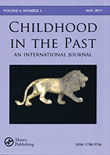
Childhood in the Past
Exploring the rich tapestry of childhood through history.Childhood in the Past is a pivotal academic journal published by Taylor & Francis Ltd, dedicated to exploring the historical perspectives of childhood through a multidisciplinary lens. With an ISSN of 1758-5716 and E-ISSN 2040-8528, this esteemed journal analyzes and contextualizes childhood across various cultures and eras, significantly contributing to the fields of Anthropology and Life-span and Life-course Studies. Despite the absence of Open Access options, the journal holds an impressive Q2 ranking in Anthropology and a Q4 ranking in Life-span and Life-course Studies, reflecting its valuable scholarly contributions. Researchers and students alike can benefit from its insights, given its Scopus rankings — placing it in the 51st percentile for Anthropology and 18th percentile for Life-span studies. Published in the United Kingdom and facilitating an engaging dialogue on childhood history, Childhood in the Past continues its quest from 2014 to 2024 to deepen the understanding of how childhood has shaped societies and continues to evolve today.
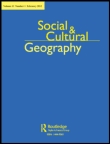
SOCIAL & CULTURAL GEOGRAPHY
Connecting cultural narratives with geographical insights.SOCIAL & CULTURAL GEOGRAPHY, published by Routledge Journals, Taylor & Francis Ltd, stands as a leading platform for innovative research in the fields of cultural studies and geography. With an impressive impact factor reflected in its Q1 ranking in both Cultural Studies and Geography, Planning and Development categories, this journal houses high-quality articles and theoretical frameworks that shape contemporary discussions in social and cultural geography. Its rigorous indexing, including a commendable Scopus Rank—#20 out of 1304 in Cultural Studies—underscores its significance and influence in the academic community. Operating since 2000 and continuing to thrive until 2024, SOCIAL & CULTURAL GEOGRAPHY promotes interdisciplinary dialogues while fostering a deeper understanding of the intricate relationships between society and space. We encourage researchers, professionals, and students to engage with resourceful insights and critical perspectives published in this pivotal journal, thereby contributing to the evolving landscape of geographical thought.

Infancias Imagenes
Illuminating the Intersection of Images and ChildhoodWelcome to Infancias Imagenes, a premier journal dedicated to the interdisciplinary study of children's images and representations, published by UNIV DISTRITAL FRANCISCO JOSE CALDAS. Since its inception in 2006, this Open Access journal has served as a vital platform for researchers, educators, and practitioners to explore the multifaceted dimensions of childhood through visual culture, pedagogy, and social discourse. With its commitment to disseminating high-quality research, Infancias Imagenes plays a significant role in shaping the academic landscape, fostering dialogue among stakeholders across various disciplines. As an emerging voice in the field, the journal invites contributions that not only advance scholarly discussion but also engage with pressing societal issues surrounding childhood, ensuring its relevance in both academic and professional contexts. The journal is accessible online, enhancing visibility and allowing for a broader audience to engage with cutting-edge research in children's image studies.